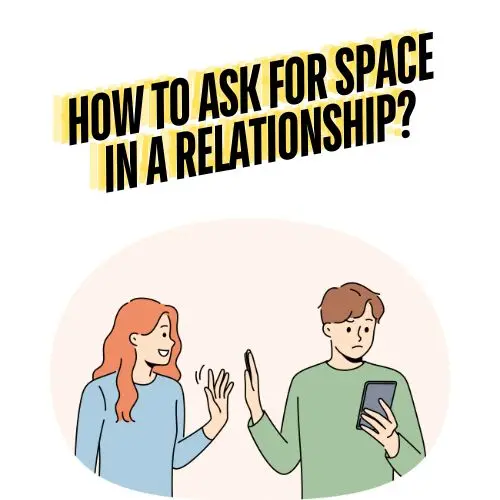Opening Thought
There are always ups and downs in every relationship. As much as love includes intimacy and togetherness, losing energy from this and feeling a need to be on your own is possible. However, doing it can be somewhat akin to negotiating between life and death—you are willing to communicate your needs without upsetting your partner. This guide will show ways to ask for space while maintaining the integrity of the relationship as part of the solution.
Why Space Matters in a Relationship

If we could just emphasize that the relationship with the self is at least as important as the relationship with the partner. Solitary does not indicate an issue; rather, it is critical for human beings to get some personal space and bond again. Here’s why taking space is healthy:
- Recharge Your Energy: As with all intimate relationships, too much time with each other may result in stress, mood swings or crankiness. They state that being in solitude means that they are able to refresh and come back with charging.
- Rediscover Yourself: Being on your own allows you an opportunity to think, do what makes you interested and have an individual life apart from the partnership.
- Foster Appreciation: Even if you spend most of your time with your significant other, short interruptions help you long for them.
- Prevent Resentment: Meeting your spatial needs before they become a problem eliminates aggressive feelings or burned-out emotions.
Psychological research proves that solitude helps people become more skilled at regulating their emotions and gaining personal independence. It also increases the level of solidarity with a partner, which helps to strengthen the relationship.
Signs It’s Time to Ask for Space

I’m not sure if you need some breathing room. Here are some key indicators:
- Increased Irritability: Small incidences your partner has been doing that you never really cared much about now start stressing you up.
- Decreased Energy: Your affection towards each other seems to disappear, and you spend little time together.
- Loss of Focus: Your self-employment becomes an issue since you get distracted by your partner when you dedicate time to your interests.
- Feelings of Claustrophobia: The situation becomes that the girl feels the man is too possessive or cares about her too much.
- Dwindling Attraction: A weariness sets in after some time, leading to emotional or physical attraction fading for a while.
If you notice these signs, it’s time to evaluate your needs and communicate them respectfully.
Timing It Right

Choosing the right moment to ask for space is crucial. Here are some tips to ensure your request lands well:
- Do not discuss it when you are angry during a quarrel, or right after a fight.
- Do not talk about it on days when your partner already seems troubled or angry.
- To avoid conflict, make sure you spend a good time with your partner before introducing the idea.
- Be clear that it is not the product of troubles within the relationship between the two companies.
Thoughtful timing shows care for your partner’s feelings and helps create a more understanding atmosphere.
How to Ask for Space Without Hurting Feelings
Navigating the conversation can be tricky, but with the right approach, it’s possible to communicate your needs while minimizing hurt or confusion. Here’s how:
- Start with Reassurance: You should start by reaffirming your love and intentions. For example, “I really do love us, and I wish for the best of our relationship.”
- Use “I” Statements: Do not blame your partner for what you lack when framing the conversation about what you require. For example: “I’ve been harassed and overwhelmed and believe getting some alone time might do me some good.”
- Be Specific: Be certain to describe what you think “space” is in clear detail. Is it an hour every night for solitude and to read? A solo weekend trip? That means the more concrete you are, the less confusion there can be.
- Set Boundaries: Tell your partner that this would only be for a while and not because one is unhappy with the other. Offer a timeline if possible, such as: “I would like to get one night a week without having to rush around taking care of everyone else.”
- Stay Connected: Develop techniques to uphold end-user interconnectedness in this period. For example, “Even as I am getting some space, I want to be able to text goodnight to you daily.”
- Listen to Their Feelings: Let your partner speak their mind and heart out about how they feel or are worried. Acknowledge their emotions and then tell them why the time is necessary to be apart for both of you.
Addressing Common Pushback
Your partner might feel insecure or worried when you ask for space. Here’s how to respond to common concerns:
- “Are you upset with me?” Reassure them: What this is not is any task you may have performed. All I want is some time to spend away from your company and the rest of the world so I can come back and be the best person that I can be for them.”
- “Don’t you love me anymore?” Clarify: “I love you deeply. This is all about doing a little something for myself so I can continue to offer the best in the relationship.”
- “What if I feel lonely?” Offer solutions: “Okay, why don’t we set time to check on each other or think about how you can also have your fun while I am gone?”
Empathy and clear communication will go a long way in easing their concerns.
Strategies for Healthy Alone Time
To make the experience smooth for both of you, consider these strategies:
- Set a Clear Duration: As much as possible, elaborate on some of the time apart advance at least as to how long it will take.
- Plan Solo Activities: It is also important not to interrupt your partner’s routine and invite them to go do their own things, meet friends, or work on projects during this period.
- Stay in Touch: Stay communicative and be okay with small things, such as a good night message or random calls and text messages.
- Reconnect Intentionally: Make a dinner date or engagement to enjoy the moments that come after alone time for both of you as a couple.
These strategies ensure that alone time feels like a positive adjustment rather than a disconnect.
Conclusion: Space for a Stronger Bond
Two people cannot be in a relationship and be expected to naw away at each other while moving forward individually; that is why asking for space is not about physical distance but is all about growth. If you address it with love, truth and empathy, it can only improve the relationship and deepen the enjoyment of the time you spend together. Of course, it is very important to remember that some distance can mature the passion and make the relationship much more interesting. Acknowledge the fact that in order to nurture the relationship, one must also nurture him/ herself.

